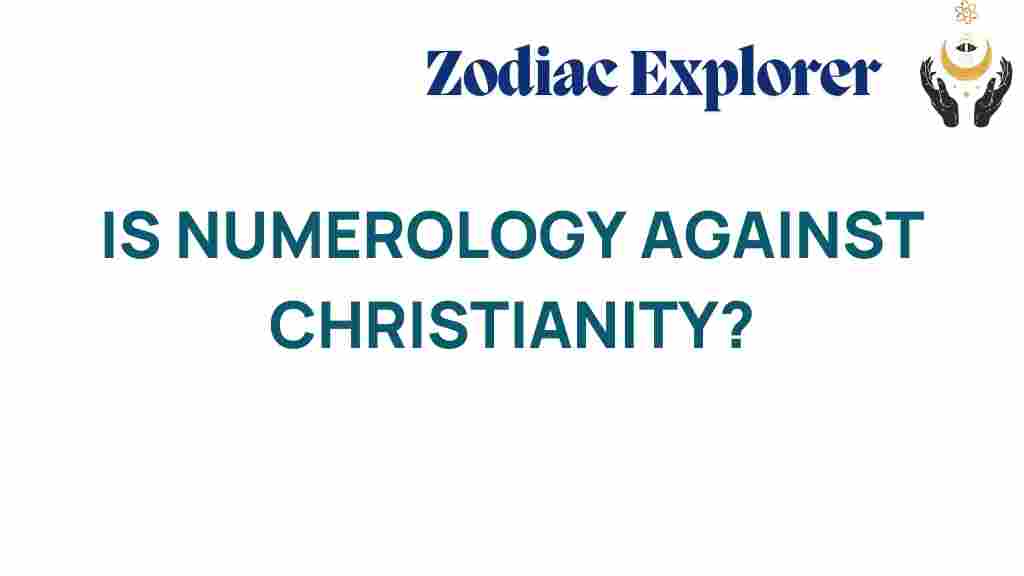Is Numerology in Conflict with Christianity?
The intersection of numerology and Christianity has long been a topic of debate among scholars, theologians, and spiritual seekers. As spirituality evolves, many individuals find themselves drawn to various systems of belief that may or may not align with traditional religious views. This article unravels the complexities surrounding numerology and its relationship with Christianity, exploring the foundational principles of both, their interpretations, and how they can coexist or conflict.
Understanding Numerology
Numerology is a belief system that assigns mystical significance to numbers and their combinations, suggesting that they can influence human life and events. It is often categorized as a form of divination, where practitioners seek to gain insights into personality traits, life paths, and even future events through numerical calculations.
- Life Path Numbers: Derived from one’s birth date, these numbers are believed to reveal key characteristics and life challenges.
- Destiny Numbers: Calculated from a person’s full name, destiny numbers are thought to illuminate one’s purpose in life.
- Personal Year Numbers: These numbers indicate the themes and experiences expected in a given year of one’s life.
Numerology is rich in symbolism, with each number carrying its own significance. For instance, the number 1 often symbolizes leadership and independence, while the number 7 is associated with introspection and spiritual awakening.
Christianity: A Brief Overview
Christianity is a monotheistic faith centered on the life and teachings of Jesus Christ. It emphasizes a personal relationship with God, salvation through faith, and the significance of scripture. The core beliefs include:
- Faith in Jesus Christ: Christians believe that Jesus is the Son of God and the savior of humanity.
- The Holy Trinity: The belief in one God in three persons: the Father, the Son, and the Holy Spirit.
- The Bible: Considered the authoritative text, it guides the beliefs and practices of Christians.
Christianity also incorporates various interpretations of scripture and teachings, leading to diverse denominations and theological perspectives.
The Conflict: Numerology vs. Christianity
At first glance, it may seem that numerology stands in direct contradiction to Christianity. Here are some key points of contention:
- Divination: Many Christians view numerology as a form of divination, which is often condemned in biblical texts (Deuteronomy 18:10-12) as it suggests seeking knowledge outside of God.
- Symbolism: While numbers play a significant role in the Bible (e.g., the number 3 representing the Trinity), the interpretations of numbers in numerology may deviate from Christian teachings.
- Source of Truth: Christianity emphasizes faith and scripture as the ultimate sources of truth, whereas numerology derives insights from numbers and their combinations.
Exploring Common Ground
Despite the points of conflict, it is essential to explore whether there can be a harmonious relationship between numerology and Christianity. Some individuals find ways to incorporate aspects of numerology into their spiritual practice without abandoning their Christian faith:
- Personal Reflection: Numerology can be used as a tool for self-reflection and understanding. Many Christians engage in self-examination and personal growth, which can align with numerological insights.
- Symbolic Interpretation: The use of numbers as symbols can enhance the understanding of biblical texts. For example, the number 12 in the Bible symbolizes completeness (e.g., 12 tribes of Israel).
- Faith and Spirituality: Both numerology and Christianity emphasize the importance of spirituality and personal connection with the divine, albeit through different lenses.
Step-by-Step Process: Integrating Numerology and Christianity
If one wishes to explore both numerology and Christianity, here are steps to consider:
- Educate Yourself: Read about numerology and its principles. Understand its history, meanings, and how it is practiced.
- Study Scripture: Deepen your knowledge of Christian teachings and how they relate to spirituality and personal growth.
- Reflect: Use numerology as a tool for self-reflection. Consider how your life path number or destiny number might provide insights into your personality and challenges.
- Seek Guidance: Talk to spiritual leaders or counselors who can provide perspective on integrating these practices.
- Pray for Wisdom: Approach the intersection of numerology and Christianity with prayer, seeking divine guidance on your journey.
Troubleshooting Tips for Potential Conflicts
If you find yourself struggling with the integration of numerology and Christianity, consider these troubleshooting tips:
- Clarify Your Intentions: Understand why you are interested in numerology. Ensure that it aligns with your core beliefs and values.
- Remain Rooted in Faith: Keep your faith at the forefront of your spiritual journey. Use numerology as a complementary tool rather than a replacement for faith.
- Avoid Extremes: Balance your interest in numerology with traditional Christian practices, such as prayer and scripture study.
- Engage in Open Discussions: Talk to fellow Christians about your interest in numerology. Open dialogue can help you navigate any feelings of conflict.
The debate surrounding numerology and Christianity is complex and multifaceted. While there are significant points of conflict, particularly regarding divination and the source of truth, many individuals find ways to incorporate numerological insights into their spiritual journey without compromising their faith.
Ultimately, the relationship between numerology and Christianity is deeply personal. It encourages individuals to explore their spirituality, beliefs, and interpretations of the world around them. Whether one sees numerology as a valuable tool for self-discovery or views it strictly as a conflicting belief system, it is essential to engage with both perspectives thoughtfully and respectfully.
For further reading on the role of numbers in Christianity, you may explore this resource. Additionally, if you’re interested in numerology, consider looking into reputable books or guides that explain its principles in depth.
By approaching the topic with an open heart and mind, individuals can navigate the complexities of faith, spirituality, and divination in a way that honors both traditions.
This article is in the category Myths and created by ZodiacExplorer Team
